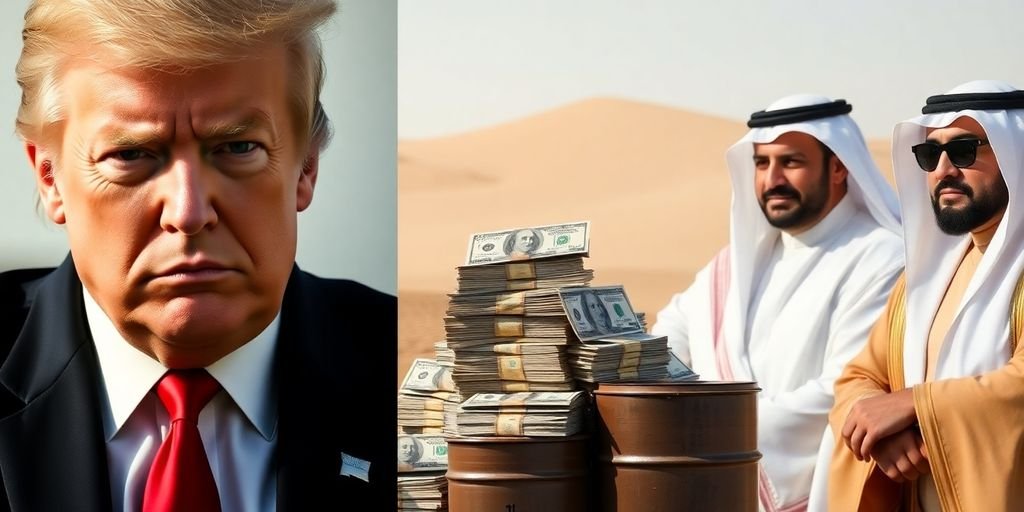President Donald Trump’s recent Middle East tour has concluded with a flurry of multi-billion dollar deals, particularly with the United Arab Emirates. While the administration hails these agreements as economic triumphs, critics are raising significant conflict of interest concerns due to the Trump family’s burgeoning business ventures in the region.
Billions in Deals Secured
President Trump’s four-day tour, encompassing Saudi Arabia, Qatar, and the UAE, focused heavily on securing financial commitments. A major highlight was the agreement with the UAE for the purchase of advanced AI semiconductors from U.S. companies. This deal is projected to generate billions of dollars and accelerate the UAE’s ambition to become a global AI hub. Additionally, the UAE pledged to increase its energy investments in the U.S. to $440 billion over the next decade, a substantial jump from the current $70 billion.
Other notable agreements include:
- A $14.5 billion commitment from Etihad Airways to invest in 28 American-made Boeing aircraft.
- A broader 10-year, $1.4 trillion investment framework from the UAE in U.S. sectors such as energy, AI, and manufacturing.
Conflict of Interest Allegations
The tour has been overshadowed by accusations of conflict of interest, primarily stemming from the Trump family’s deepening business ties in the UAE. A key point of contention is the $2 billion investment by an Abu Dhabi-backed firm, MGX, into Binance, utilizing USD1, a stablecoin launched by the Trump family’s cryptocurrency firm, World Liberty Financial.
- Trump Family Involvement: Donald Trump serves as the "chief crypto advocate" for World Liberty Financial, with his sons Eric Trump and Donald Trump Jr. holding "Web3 ambassador" titles, and Barron Trump listed as the "DeFi visionary."
- Steve Witkoff’s Role: Steve Witkoff, a real estate developer and close Trump associate, co-founded World Liberty Financial and is currently serving as the President’s envoy to peace talks in the Middle East and Russia. Critics argue this creates a direct link between official diplomatic duties and private financial gain.
- Ethical Concerns: Senators Chris Murphy and Elizabeth Warren have publicly criticized the arrangement, labeling it "corrupt" and "likely illegal." They suggest the UAE’s investment in the Trump-linked cryptocurrency is a "quid pro quo" for favorable U.S. policy, such as the relaxation of restrictions on semiconductor exports to the UAE.
White House Response
The White House has dismissed these concerns, stating that President Trump’s assets are in a trust managed by his children and that there are "no conflicts of interest." However, critics argue that the open use of the Trump family’s association with the presidency to generate profit for their businesses is a clear ethical breach.
Key Takeaways
- President Trump’s Middle East tour yielded significant economic agreements, particularly with the UAE, focusing on AI, energy, and manufacturing sectors.
- The deals are projected to bring billions of dollars in investment to the U.S. economy.
- Simultaneously, the Trump family’s business ventures, especially in cryptocurrency, have seen substantial investments from UAE-backed entities.
- Critics allege a direct conflict of interest, suggesting that foreign investments in Trump family businesses are influencing U.S. foreign policy decisions.
- The White House maintains there are no conflicts of interest, citing the management of Trump’s assets by his children.
Sources
- Key Business Goals for UAE Highlight Presidential Visit, U.S. Chamber of Commerce.
- Trump wraps up Gulf tour with AI and energy deals in UAE, Reuters.
- Trump and special envoy Witkoff stand to reap rewards from official business | Donald Trump, The Guardian.
- UAE-backed firm to use Trump family crypto to buy $2B stake in Binance, New York Post.
- Trump’s Middle East business surge prompts conflict of interest attacks from critics, Newsweek.
